Organisational Behaviour and Culture: A Case Study of Sainsbury
VerifiedAdded on 2023/06/18
|14
|3377
|62
AI Summary
This report analyses the organisational behaviour and culture of Sainsbury, a leading supermarket chain in the UK. It covers Handy's cultural model, the role of culture in enhancing company effectiveness with a focus on communication, the impact of culture on employee motivation, and how Sainsbury can use its culture for further enhancement.
Contribute Materials
Your contribution can guide someone’s learning journey. Share your
documents today.
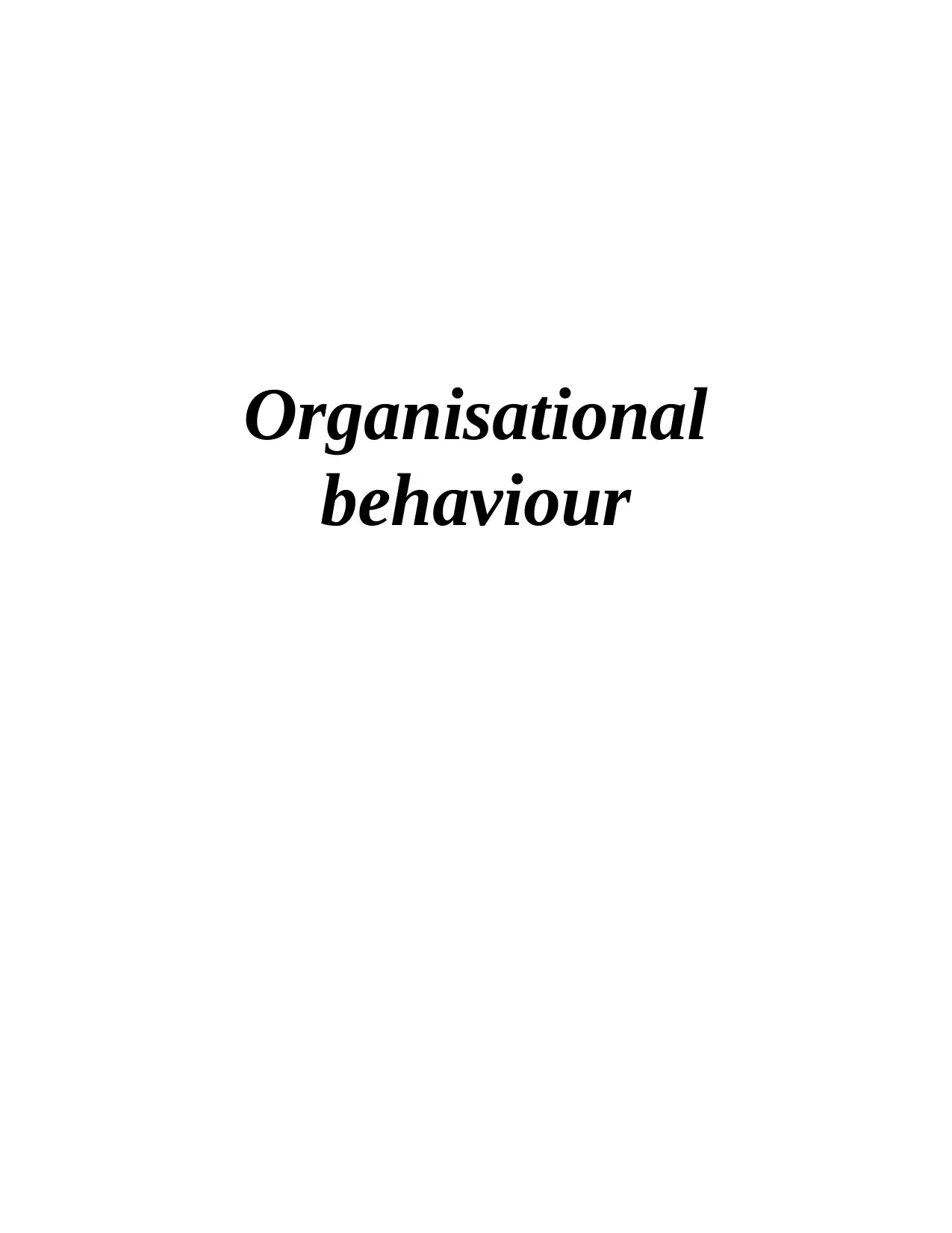
Organisational
behaviour
behaviour
Secure Best Marks with AI Grader
Need help grading? Try our AI Grader for instant feedback on your assignments.
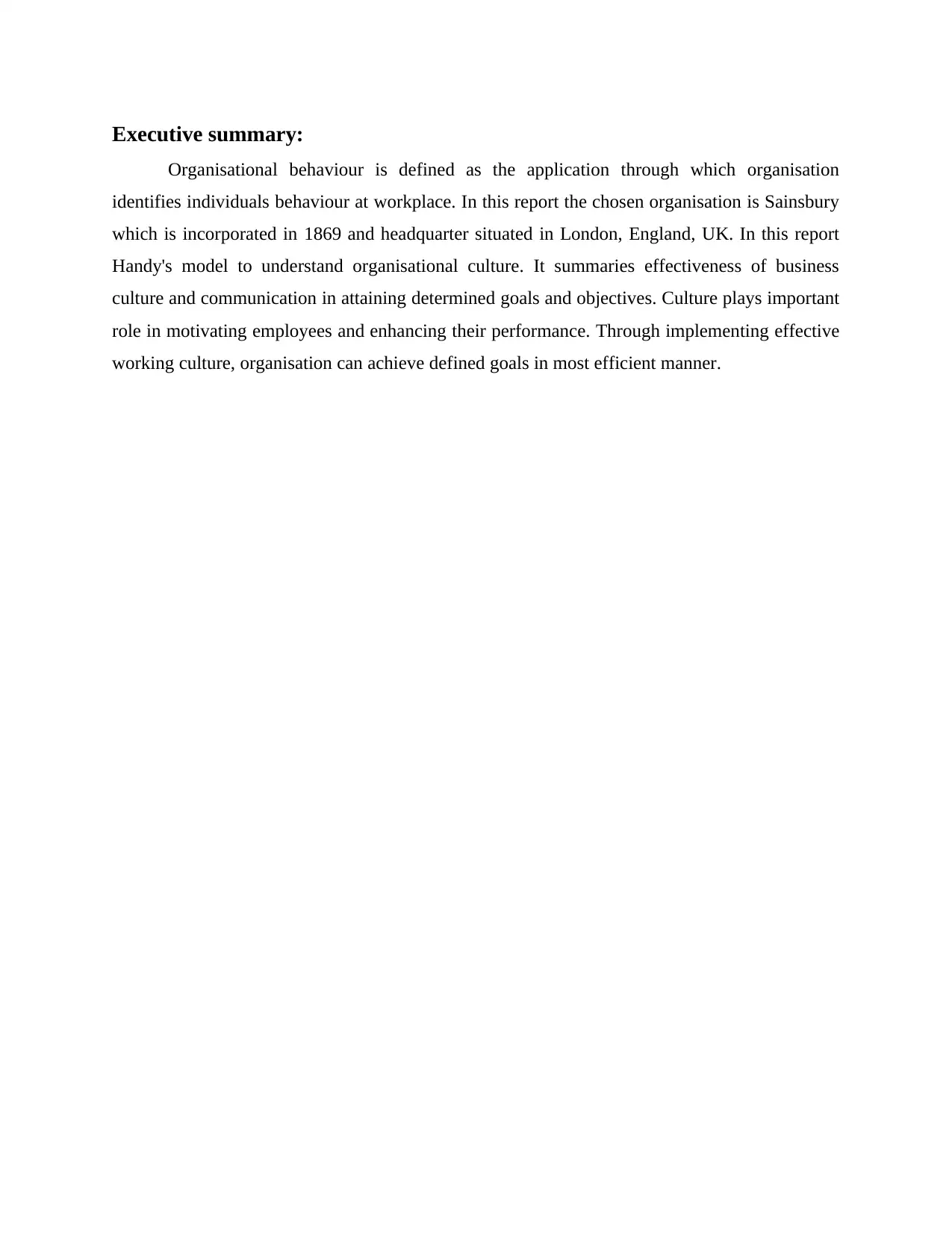
Executive summary:
Organisational behaviour is defined as the application through which organisation
identifies individuals behaviour at workplace. In this report the chosen organisation is Sainsbury
which is incorporated in 1869 and headquarter situated in London, England, UK. In this report
Handy's model to understand organisational culture. It summaries effectiveness of business
culture and communication in attaining determined goals and objectives. Culture plays important
role in motivating employees and enhancing their performance. Through implementing effective
working culture, organisation can achieve defined goals in most efficient manner.
Organisational behaviour is defined as the application through which organisation
identifies individuals behaviour at workplace. In this report the chosen organisation is Sainsbury
which is incorporated in 1869 and headquarter situated in London, England, UK. In this report
Handy's model to understand organisational culture. It summaries effectiveness of business
culture and communication in attaining determined goals and objectives. Culture plays important
role in motivating employees and enhancing their performance. Through implementing effective
working culture, organisation can achieve defined goals in most efficient manner.
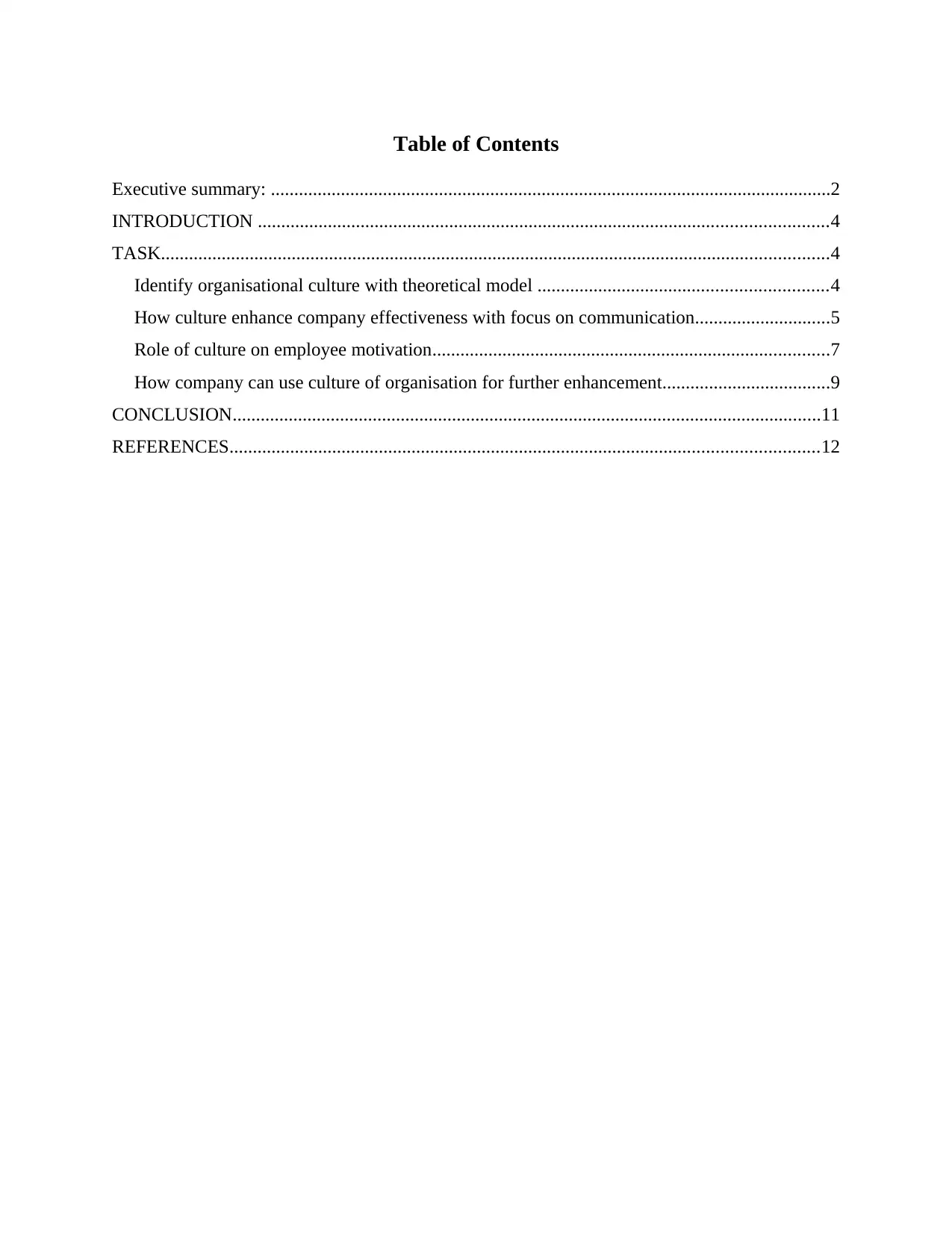
Table of Contents
Executive summary: ........................................................................................................................2
INTRODUCTION ..........................................................................................................................4
TASK...............................................................................................................................................4
Identify organisational culture with theoretical model ..............................................................4
How culture enhance company effectiveness with focus on communication.............................5
Role of culture on employee motivation.....................................................................................7
How company can use culture of organisation for further enhancement....................................9
CONCLUSION..............................................................................................................................11
REFERENCES..............................................................................................................................12
Executive summary: ........................................................................................................................2
INTRODUCTION ..........................................................................................................................4
TASK...............................................................................................................................................4
Identify organisational culture with theoretical model ..............................................................4
How culture enhance company effectiveness with focus on communication.............................5
Role of culture on employee motivation.....................................................................................7
How company can use culture of organisation for further enhancement....................................9
CONCLUSION..............................................................................................................................11
REFERENCES..............................................................................................................................12
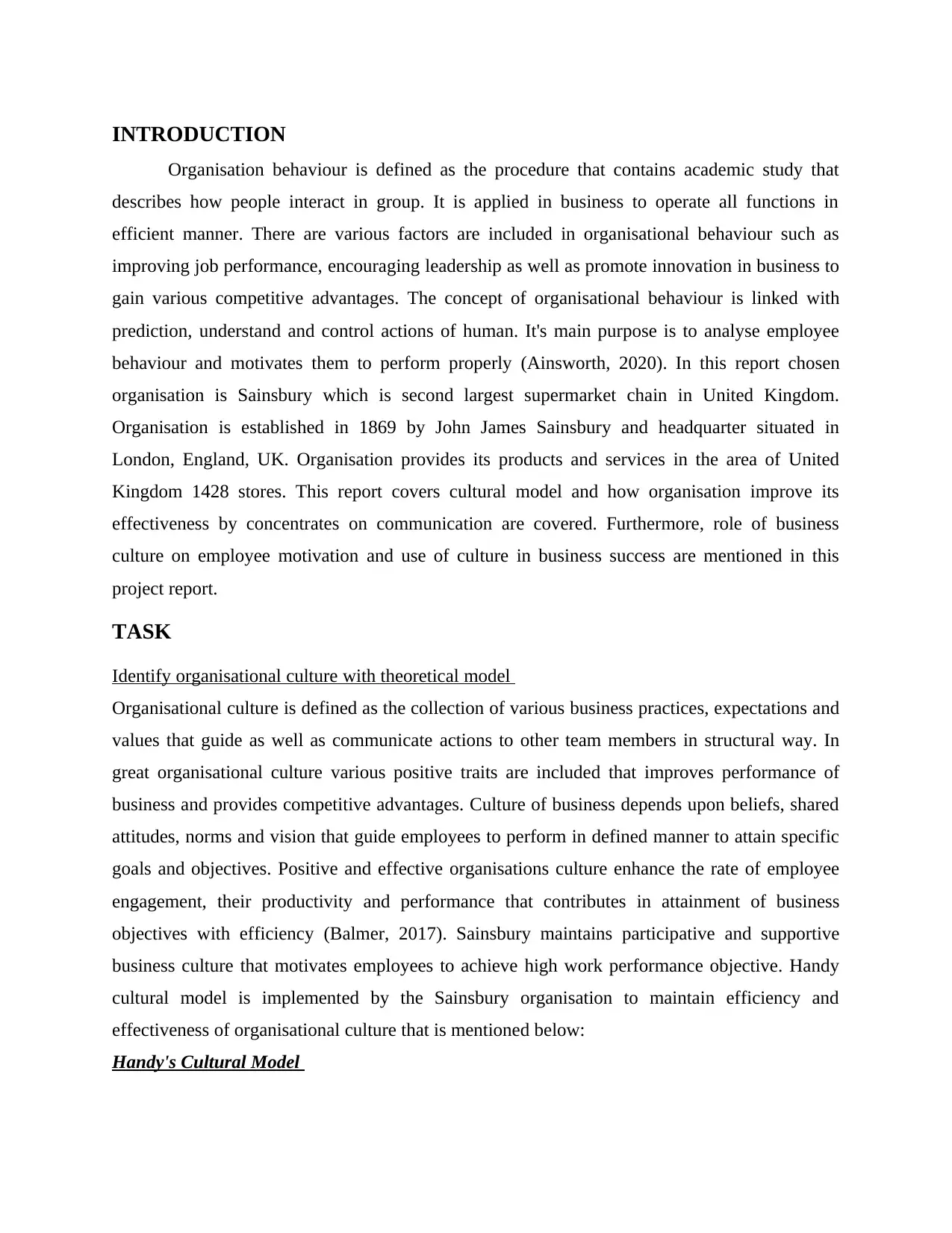
INTRODUCTION
Organisation behaviour is defined as the procedure that contains academic study that
describes how people interact in group. It is applied in business to operate all functions in
efficient manner. There are various factors are included in organisational behaviour such as
improving job performance, encouraging leadership as well as promote innovation in business to
gain various competitive advantages. The concept of organisational behaviour is linked with
prediction, understand and control actions of human. It's main purpose is to analyse employee
behaviour and motivates them to perform properly (Ainsworth, 2020). In this report chosen
organisation is Sainsbury which is second largest supermarket chain in United Kingdom.
Organisation is established in 1869 by John James Sainsbury and headquarter situated in
London, England, UK. Organisation provides its products and services in the area of United
Kingdom 1428 stores. This report covers cultural model and how organisation improve its
effectiveness by concentrates on communication are covered. Furthermore, role of business
culture on employee motivation and use of culture in business success are mentioned in this
project report.
TASK
Identify organisational culture with theoretical model
Organisational culture is defined as the collection of various business practices, expectations and
values that guide as well as communicate actions to other team members in structural way. In
great organisational culture various positive traits are included that improves performance of
business and provides competitive advantages. Culture of business depends upon beliefs, shared
attitudes, norms and vision that guide employees to perform in defined manner to attain specific
goals and objectives. Positive and effective organisations culture enhance the rate of employee
engagement, their productivity and performance that contributes in attainment of business
objectives with efficiency (Balmer, 2017). Sainsbury maintains participative and supportive
business culture that motivates employees to achieve high work performance objective. Handy
cultural model is implemented by the Sainsbury organisation to maintain efficiency and
effectiveness of organisational culture that is mentioned below:
Handy's Cultural Model
Organisation behaviour is defined as the procedure that contains academic study that
describes how people interact in group. It is applied in business to operate all functions in
efficient manner. There are various factors are included in organisational behaviour such as
improving job performance, encouraging leadership as well as promote innovation in business to
gain various competitive advantages. The concept of organisational behaviour is linked with
prediction, understand and control actions of human. It's main purpose is to analyse employee
behaviour and motivates them to perform properly (Ainsworth, 2020). In this report chosen
organisation is Sainsbury which is second largest supermarket chain in United Kingdom.
Organisation is established in 1869 by John James Sainsbury and headquarter situated in
London, England, UK. Organisation provides its products and services in the area of United
Kingdom 1428 stores. This report covers cultural model and how organisation improve its
effectiveness by concentrates on communication are covered. Furthermore, role of business
culture on employee motivation and use of culture in business success are mentioned in this
project report.
TASK
Identify organisational culture with theoretical model
Organisational culture is defined as the collection of various business practices, expectations and
values that guide as well as communicate actions to other team members in structural way. In
great organisational culture various positive traits are included that improves performance of
business and provides competitive advantages. Culture of business depends upon beliefs, shared
attitudes, norms and vision that guide employees to perform in defined manner to attain specific
goals and objectives. Positive and effective organisations culture enhance the rate of employee
engagement, their productivity and performance that contributes in attainment of business
objectives with efficiency (Balmer, 2017). Sainsbury maintains participative and supportive
business culture that motivates employees to achieve high work performance objective. Handy
cultural model is implemented by the Sainsbury organisation to maintain efficiency and
effectiveness of organisational culture that is mentioned below:
Handy's Cultural Model
Secure Best Marks with AI Grader
Need help grading? Try our AI Grader for instant feedback on your assignments.
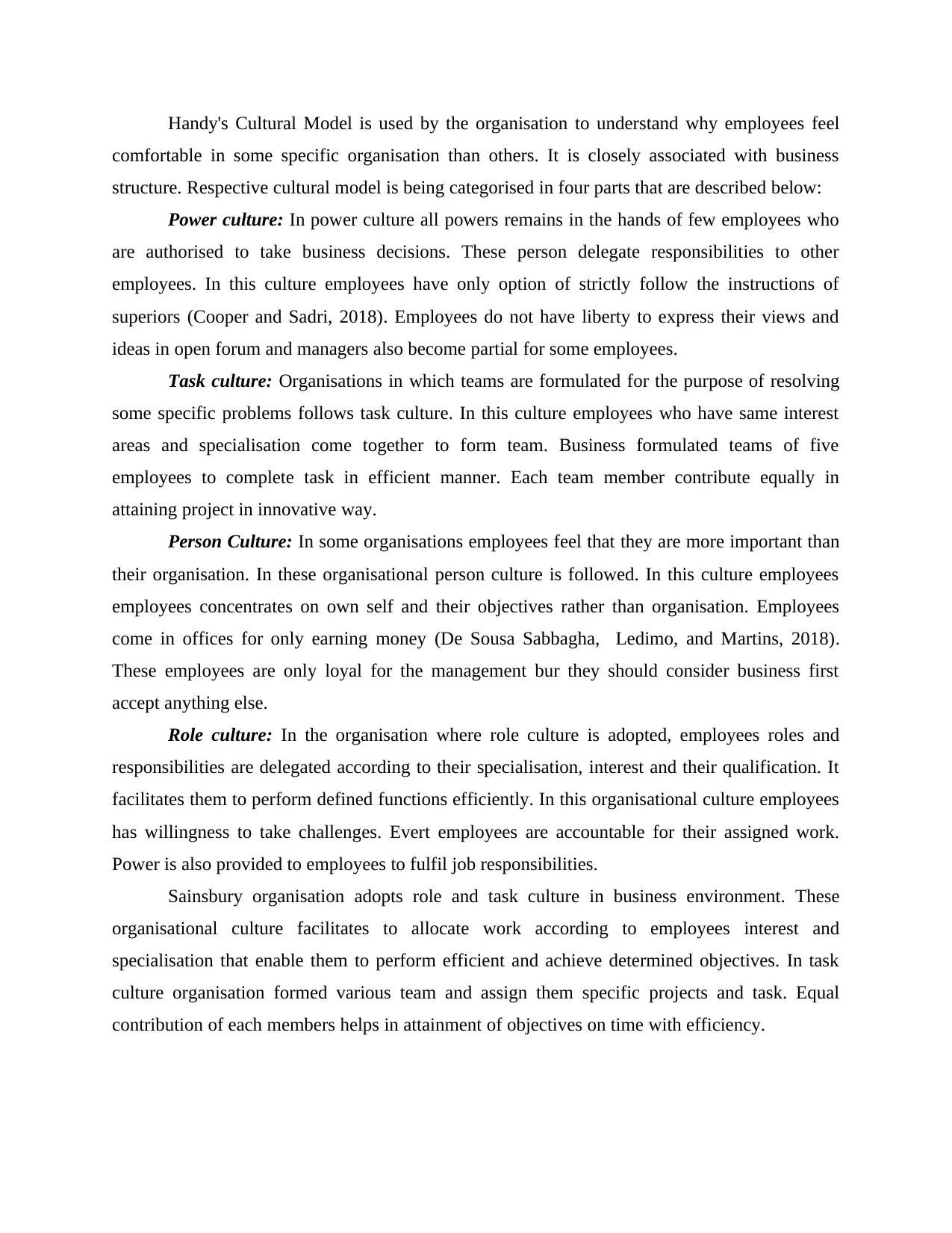
Handy's Cultural Model is used by the organisation to understand why employees feel
comfortable in some specific organisation than others. It is closely associated with business
structure. Respective cultural model is being categorised in four parts that are described below:
Power culture: In power culture all powers remains in the hands of few employees who
are authorised to take business decisions. These person delegate responsibilities to other
employees. In this culture employees have only option of strictly follow the instructions of
superiors (Cooper and Sadri, 2018). Employees do not have liberty to express their views and
ideas in open forum and managers also become partial for some employees.
Task culture: Organisations in which teams are formulated for the purpose of resolving
some specific problems follows task culture. In this culture employees who have same interest
areas and specialisation come together to form team. Business formulated teams of five
employees to complete task in efficient manner. Each team member contribute equally in
attaining project in innovative way.
Person Culture: In some organisations employees feel that they are more important than
their organisation. In these organisational person culture is followed. In this culture employees
employees concentrates on own self and their objectives rather than organisation. Employees
come in offices for only earning money (De Sousa Sabbagha, Ledimo, and Martins, 2018).
These employees are only loyal for the management bur they should consider business first
accept anything else.
Role culture: In the organisation where role culture is adopted, employees roles and
responsibilities are delegated according to their specialisation, interest and their qualification. It
facilitates them to perform defined functions efficiently. In this organisational culture employees
has willingness to take challenges. Evert employees are accountable for their assigned work.
Power is also provided to employees to fulfil job responsibilities.
Sainsbury organisation adopts role and task culture in business environment. These
organisational culture facilitates to allocate work according to employees interest and
specialisation that enable them to perform efficient and achieve determined objectives. In task
culture organisation formed various team and assign them specific projects and task. Equal
contribution of each members helps in attainment of objectives on time with efficiency.
comfortable in some specific organisation than others. It is closely associated with business
structure. Respective cultural model is being categorised in four parts that are described below:
Power culture: In power culture all powers remains in the hands of few employees who
are authorised to take business decisions. These person delegate responsibilities to other
employees. In this culture employees have only option of strictly follow the instructions of
superiors (Cooper and Sadri, 2018). Employees do not have liberty to express their views and
ideas in open forum and managers also become partial for some employees.
Task culture: Organisations in which teams are formulated for the purpose of resolving
some specific problems follows task culture. In this culture employees who have same interest
areas and specialisation come together to form team. Business formulated teams of five
employees to complete task in efficient manner. Each team member contribute equally in
attaining project in innovative way.
Person Culture: In some organisations employees feel that they are more important than
their organisation. In these organisational person culture is followed. In this culture employees
employees concentrates on own self and their objectives rather than organisation. Employees
come in offices for only earning money (De Sousa Sabbagha, Ledimo, and Martins, 2018).
These employees are only loyal for the management bur they should consider business first
accept anything else.
Role culture: In the organisation where role culture is adopted, employees roles and
responsibilities are delegated according to their specialisation, interest and their qualification. It
facilitates them to perform defined functions efficiently. In this organisational culture employees
has willingness to take challenges. Evert employees are accountable for their assigned work.
Power is also provided to employees to fulfil job responsibilities.
Sainsbury organisation adopts role and task culture in business environment. These
organisational culture facilitates to allocate work according to employees interest and
specialisation that enable them to perform efficient and achieve determined objectives. In task
culture organisation formed various team and assign them specific projects and task. Equal
contribution of each members helps in attainment of objectives on time with efficiency.
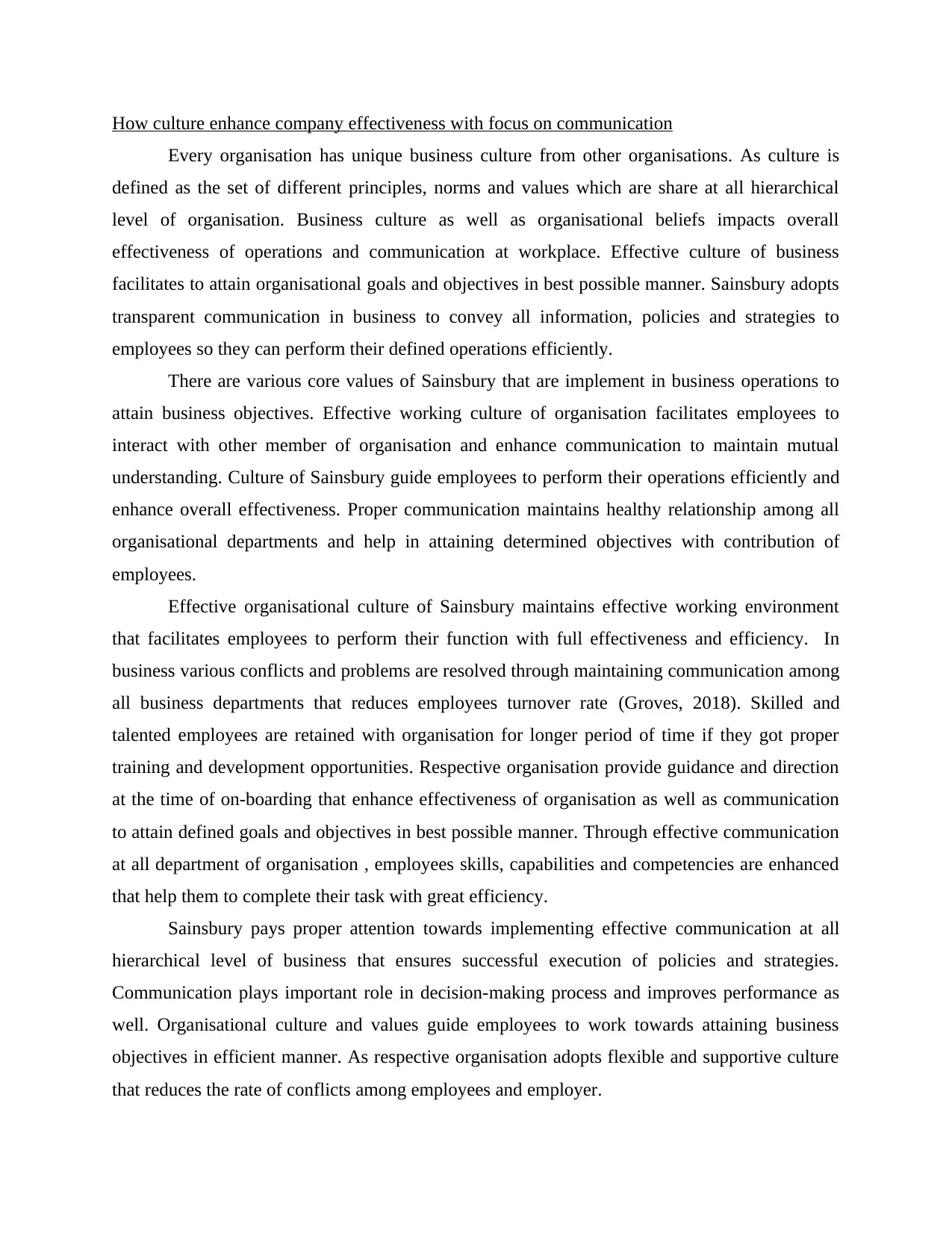
How culture enhance company effectiveness with focus on communication
Every organisation has unique business culture from other organisations. As culture is
defined as the set of different principles, norms and values which are share at all hierarchical
level of organisation. Business culture as well as organisational beliefs impacts overall
effectiveness of operations and communication at workplace. Effective culture of business
facilitates to attain organisational goals and objectives in best possible manner. Sainsbury adopts
transparent communication in business to convey all information, policies and strategies to
employees so they can perform their defined operations efficiently.
There are various core values of Sainsbury that are implement in business operations to
attain business objectives. Effective working culture of organisation facilitates employees to
interact with other member of organisation and enhance communication to maintain mutual
understanding. Culture of Sainsbury guide employees to perform their operations efficiently and
enhance overall effectiveness. Proper communication maintains healthy relationship among all
organisational departments and help in attaining determined objectives with contribution of
employees.
Effective organisational culture of Sainsbury maintains effective working environment
that facilitates employees to perform their function with full effectiveness and efficiency. In
business various conflicts and problems are resolved through maintaining communication among
all business departments that reduces employees turnover rate (Groves, 2018). Skilled and
talented employees are retained with organisation for longer period of time if they got proper
training and development opportunities. Respective organisation provide guidance and direction
at the time of on-boarding that enhance effectiveness of organisation as well as communication
to attain defined goals and objectives in best possible manner. Through effective communication
at all department of organisation , employees skills, capabilities and competencies are enhanced
that help them to complete their task with great efficiency.
Sainsbury pays proper attention towards implementing effective communication at all
hierarchical level of business that ensures successful execution of policies and strategies.
Communication plays important role in decision-making process and improves performance as
well. Organisational culture and values guide employees to work towards attaining business
objectives in efficient manner. As respective organisation adopts flexible and supportive culture
that reduces the rate of conflicts among employees and employer.
Every organisation has unique business culture from other organisations. As culture is
defined as the set of different principles, norms and values which are share at all hierarchical
level of organisation. Business culture as well as organisational beliefs impacts overall
effectiveness of operations and communication at workplace. Effective culture of business
facilitates to attain organisational goals and objectives in best possible manner. Sainsbury adopts
transparent communication in business to convey all information, policies and strategies to
employees so they can perform their defined operations efficiently.
There are various core values of Sainsbury that are implement in business operations to
attain business objectives. Effective working culture of organisation facilitates employees to
interact with other member of organisation and enhance communication to maintain mutual
understanding. Culture of Sainsbury guide employees to perform their operations efficiently and
enhance overall effectiveness. Proper communication maintains healthy relationship among all
organisational departments and help in attaining determined objectives with contribution of
employees.
Effective organisational culture of Sainsbury maintains effective working environment
that facilitates employees to perform their function with full effectiveness and efficiency. In
business various conflicts and problems are resolved through maintaining communication among
all business departments that reduces employees turnover rate (Groves, 2018). Skilled and
talented employees are retained with organisation for longer period of time if they got proper
training and development opportunities. Respective organisation provide guidance and direction
at the time of on-boarding that enhance effectiveness of organisation as well as communication
to attain defined goals and objectives in best possible manner. Through effective communication
at all department of organisation , employees skills, capabilities and competencies are enhanced
that help them to complete their task with great efficiency.
Sainsbury pays proper attention towards implementing effective communication at all
hierarchical level of business that ensures successful execution of policies and strategies.
Communication plays important role in decision-making process and improves performance as
well. Organisational culture and values guide employees to work towards attaining business
objectives in efficient manner. As respective organisation adopts flexible and supportive culture
that reduces the rate of conflicts among employees and employer.
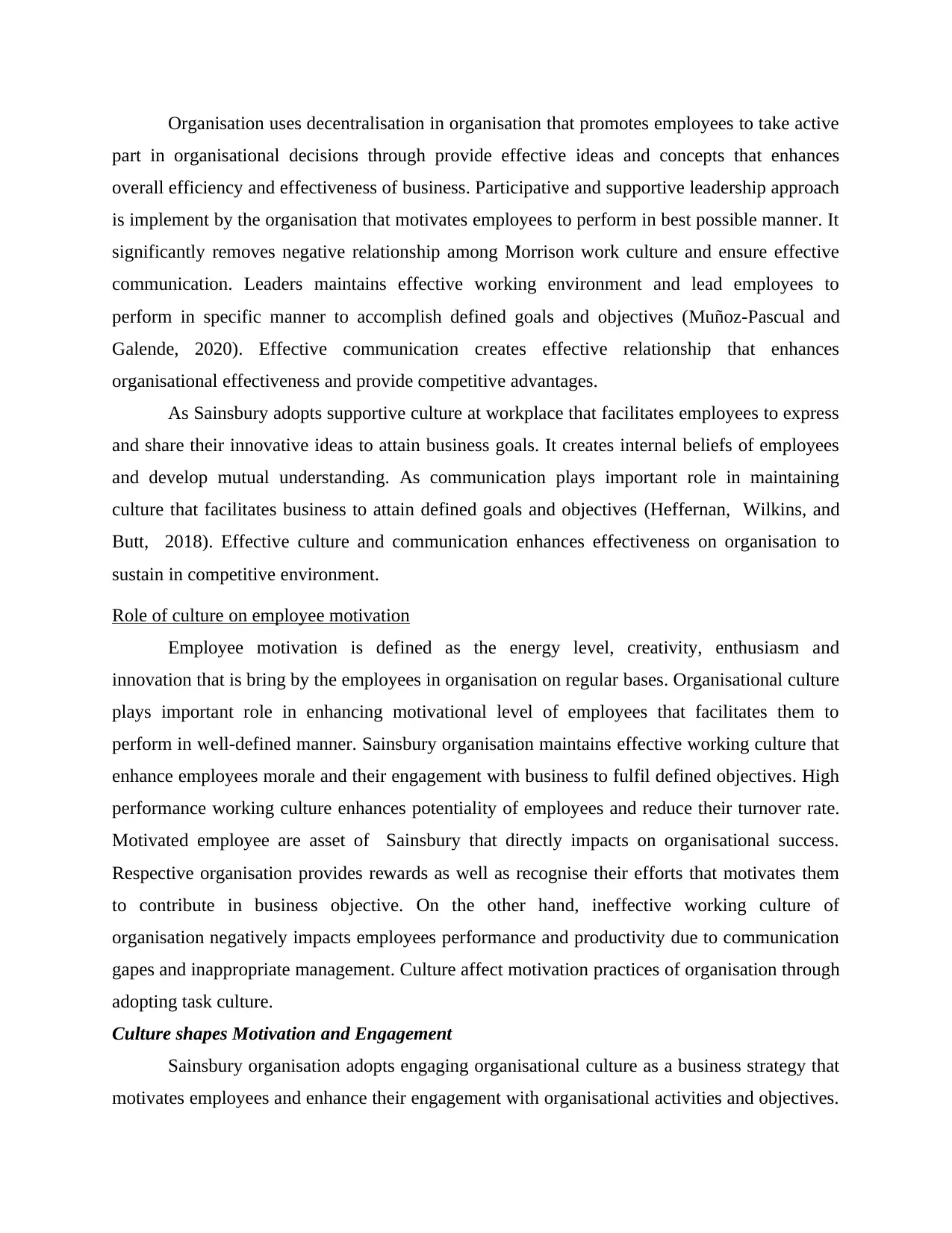
Organisation uses decentralisation in organisation that promotes employees to take active
part in organisational decisions through provide effective ideas and concepts that enhances
overall efficiency and effectiveness of business. Participative and supportive leadership approach
is implement by the organisation that motivates employees to perform in best possible manner. It
significantly removes negative relationship among Morrison work culture and ensure effective
communication. Leaders maintains effective working environment and lead employees to
perform in specific manner to accomplish defined goals and objectives (Muñoz-Pascual and
Galende, 2020). Effective communication creates effective relationship that enhances
organisational effectiveness and provide competitive advantages.
As Sainsbury adopts supportive culture at workplace that facilitates employees to express
and share their innovative ideas to attain business goals. It creates internal beliefs of employees
and develop mutual understanding. As communication plays important role in maintaining
culture that facilitates business to attain defined goals and objectives (Heffernan, Wilkins, and
Butt, 2018). Effective culture and communication enhances effectiveness on organisation to
sustain in competitive environment.
Role of culture on employee motivation
Employee motivation is defined as the energy level, creativity, enthusiasm and
innovation that is bring by the employees in organisation on regular bases. Organisational culture
plays important role in enhancing motivational level of employees that facilitates them to
perform in well-defined manner. Sainsbury organisation maintains effective working culture that
enhance employees morale and their engagement with business to fulfil defined objectives. High
performance working culture enhances potentiality of employees and reduce their turnover rate.
Motivated employee are asset of Sainsbury that directly impacts on organisational success.
Respective organisation provides rewards as well as recognise their efforts that motivates them
to contribute in business objective. On the other hand, ineffective working culture of
organisation negatively impacts employees performance and productivity due to communication
gapes and inappropriate management. Culture affect motivation practices of organisation through
adopting task culture.
Culture shapes Motivation and Engagement
Sainsbury organisation adopts engaging organisational culture as a business strategy that
motivates employees and enhance their engagement with organisational activities and objectives.
part in organisational decisions through provide effective ideas and concepts that enhances
overall efficiency and effectiveness of business. Participative and supportive leadership approach
is implement by the organisation that motivates employees to perform in best possible manner. It
significantly removes negative relationship among Morrison work culture and ensure effective
communication. Leaders maintains effective working environment and lead employees to
perform in specific manner to accomplish defined goals and objectives (Muñoz-Pascual and
Galende, 2020). Effective communication creates effective relationship that enhances
organisational effectiveness and provide competitive advantages.
As Sainsbury adopts supportive culture at workplace that facilitates employees to express
and share their innovative ideas to attain business goals. It creates internal beliefs of employees
and develop mutual understanding. As communication plays important role in maintaining
culture that facilitates business to attain defined goals and objectives (Heffernan, Wilkins, and
Butt, 2018). Effective culture and communication enhances effectiveness on organisation to
sustain in competitive environment.
Role of culture on employee motivation
Employee motivation is defined as the energy level, creativity, enthusiasm and
innovation that is bring by the employees in organisation on regular bases. Organisational culture
plays important role in enhancing motivational level of employees that facilitates them to
perform in well-defined manner. Sainsbury organisation maintains effective working culture that
enhance employees morale and their engagement with business to fulfil defined objectives. High
performance working culture enhances potentiality of employees and reduce their turnover rate.
Motivated employee are asset of Sainsbury that directly impacts on organisational success.
Respective organisation provides rewards as well as recognise their efforts that motivates them
to contribute in business objective. On the other hand, ineffective working culture of
organisation negatively impacts employees performance and productivity due to communication
gapes and inappropriate management. Culture affect motivation practices of organisation through
adopting task culture.
Culture shapes Motivation and Engagement
Sainsbury organisation adopts engaging organisational culture as a business strategy that
motivates employees and enhance their engagement with organisational activities and objectives.
Paraphrase This Document
Need a fresh take? Get an instant paraphrase of this document with our AI Paraphraser
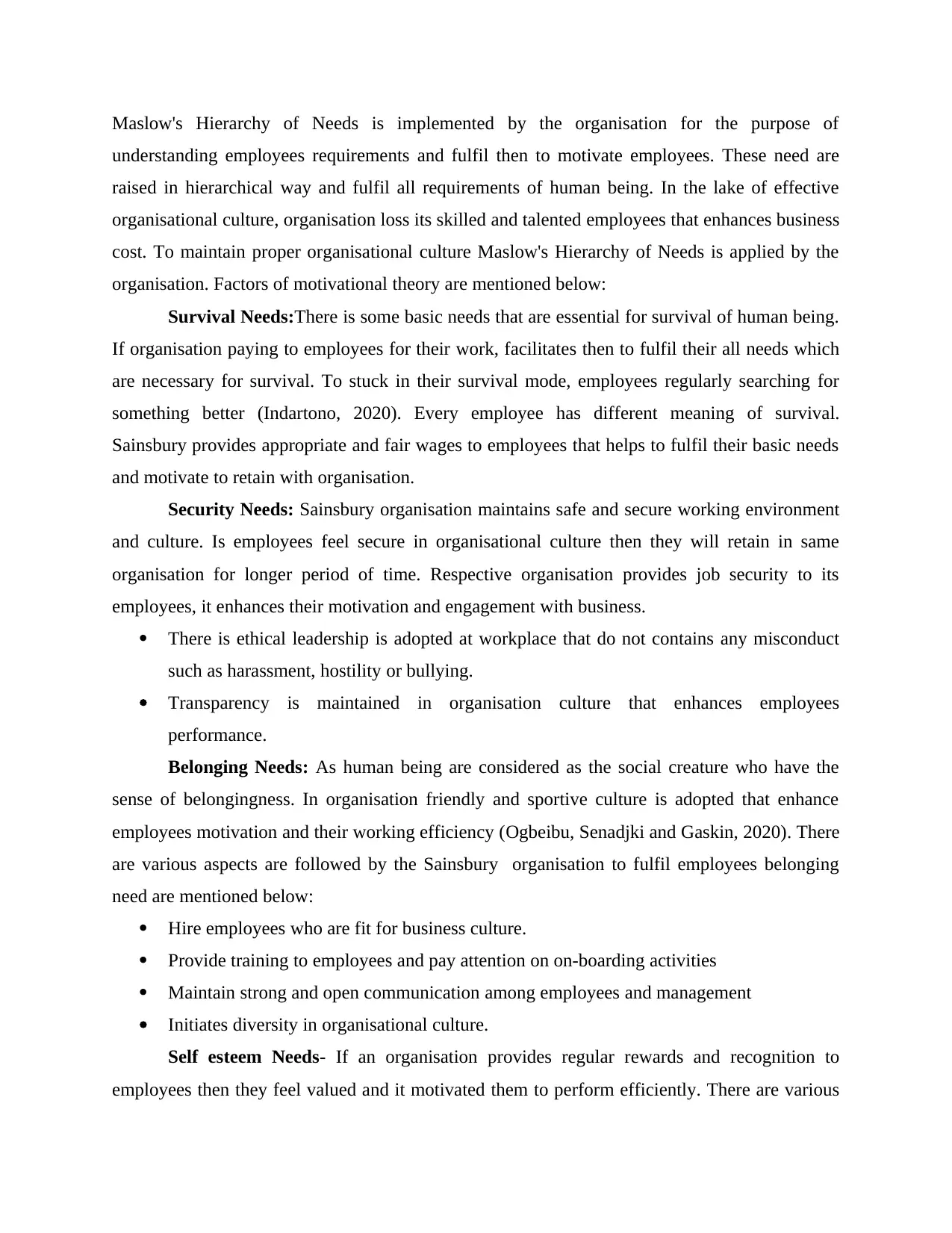
Maslow's Hierarchy of Needs is implemented by the organisation for the purpose of
understanding employees requirements and fulfil then to motivate employees. These need are
raised in hierarchical way and fulfil all requirements of human being. In the lake of effective
organisational culture, organisation loss its skilled and talented employees that enhances business
cost. To maintain proper organisational culture Maslow's Hierarchy of Needs is applied by the
organisation. Factors of motivational theory are mentioned below:
Survival Needs:There is some basic needs that are essential for survival of human being.
If organisation paying to employees for their work, facilitates then to fulfil their all needs which
are necessary for survival. To stuck in their survival mode, employees regularly searching for
something better (Indartono, 2020). Every employee has different meaning of survival.
Sainsbury provides appropriate and fair wages to employees that helps to fulfil their basic needs
and motivate to retain with organisation.
Security Needs: Sainsbury organisation maintains safe and secure working environment
and culture. Is employees feel secure in organisational culture then they will retain in same
organisation for longer period of time. Respective organisation provides job security to its
employees, it enhances their motivation and engagement with business.
There is ethical leadership is adopted at workplace that do not contains any misconduct
such as harassment, hostility or bullying.
Transparency is maintained in organisation culture that enhances employees
performance.
Belonging Needs: As human being are considered as the social creature who have the
sense of belongingness. In organisation friendly and sportive culture is adopted that enhance
employees motivation and their working efficiency (Ogbeibu, Senadjki and Gaskin, 2020). There
are various aspects are followed by the Sainsbury organisation to fulfil employees belonging
need are mentioned below:
Hire employees who are fit for business culture.
Provide training to employees and pay attention on on-boarding activities
Maintain strong and open communication among employees and management
Initiates diversity in organisational culture.
Self esteem Needs- If an organisation provides regular rewards and recognition to
employees then they feel valued and it motivated them to perform efficiently. There are various
understanding employees requirements and fulfil then to motivate employees. These need are
raised in hierarchical way and fulfil all requirements of human being. In the lake of effective
organisational culture, organisation loss its skilled and talented employees that enhances business
cost. To maintain proper organisational culture Maslow's Hierarchy of Needs is applied by the
organisation. Factors of motivational theory are mentioned below:
Survival Needs:There is some basic needs that are essential for survival of human being.
If organisation paying to employees for their work, facilitates then to fulfil their all needs which
are necessary for survival. To stuck in their survival mode, employees regularly searching for
something better (Indartono, 2020). Every employee has different meaning of survival.
Sainsbury provides appropriate and fair wages to employees that helps to fulfil their basic needs
and motivate to retain with organisation.
Security Needs: Sainsbury organisation maintains safe and secure working environment
and culture. Is employees feel secure in organisational culture then they will retain in same
organisation for longer period of time. Respective organisation provides job security to its
employees, it enhances their motivation and engagement with business.
There is ethical leadership is adopted at workplace that do not contains any misconduct
such as harassment, hostility or bullying.
Transparency is maintained in organisation culture that enhances employees
performance.
Belonging Needs: As human being are considered as the social creature who have the
sense of belongingness. In organisation friendly and sportive culture is adopted that enhance
employees motivation and their working efficiency (Ogbeibu, Senadjki and Gaskin, 2020). There
are various aspects are followed by the Sainsbury organisation to fulfil employees belonging
need are mentioned below:
Hire employees who are fit for business culture.
Provide training to employees and pay attention on on-boarding activities
Maintain strong and open communication among employees and management
Initiates diversity in organisational culture.
Self esteem Needs- If an organisation provides regular rewards and recognition to
employees then they feel valued and it motivated them to perform efficiently. There are various
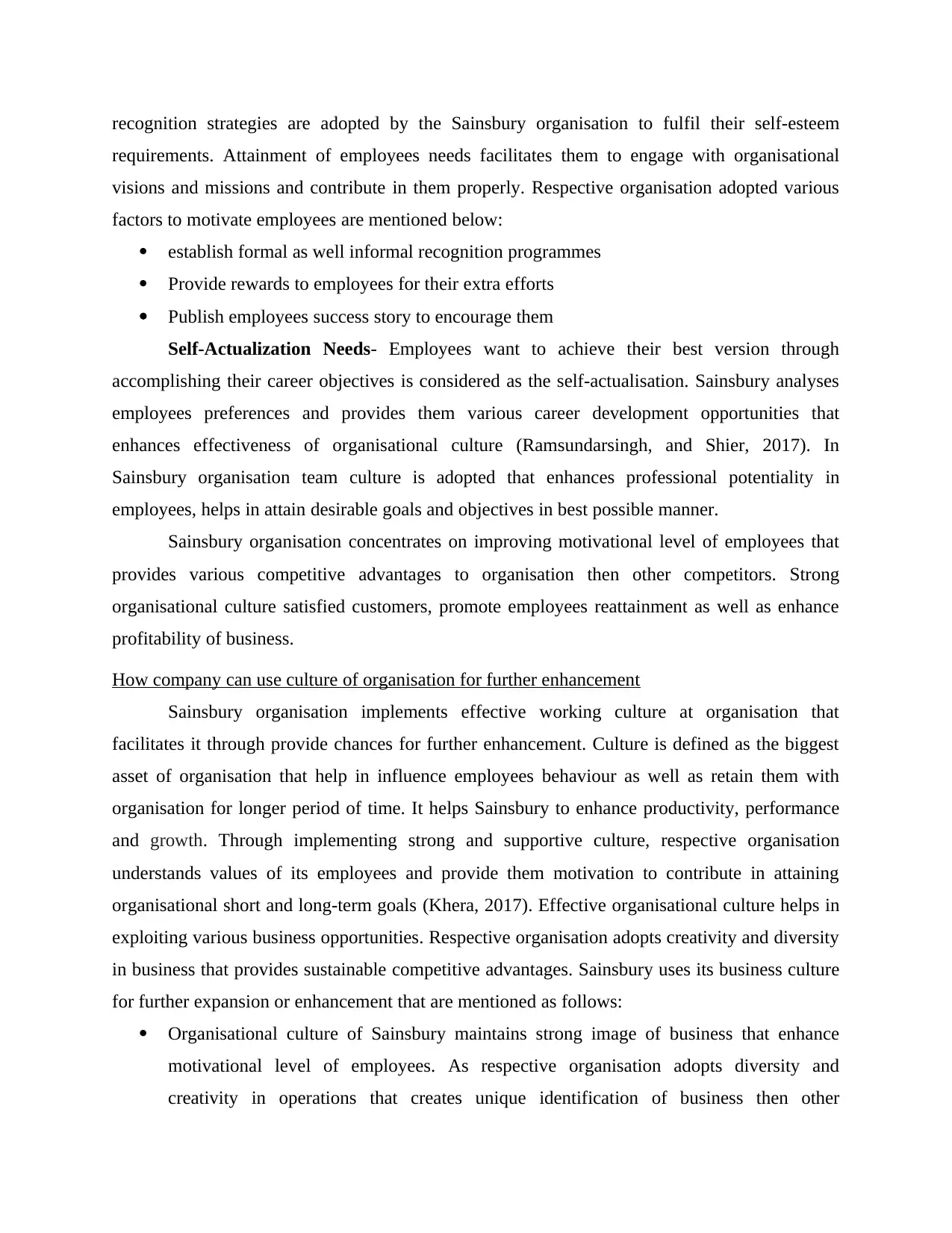
recognition strategies are adopted by the Sainsbury organisation to fulfil their self-esteem
requirements. Attainment of employees needs facilitates them to engage with organisational
visions and missions and contribute in them properly. Respective organisation adopted various
factors to motivate employees are mentioned below:
establish formal as well informal recognition programmes
Provide rewards to employees for their extra efforts
Publish employees success story to encourage them
Self-Actualization Needs- Employees want to achieve their best version through
accomplishing their career objectives is considered as the self-actualisation. Sainsbury analyses
employees preferences and provides them various career development opportunities that
enhances effectiveness of organisational culture (Ramsundarsingh, and Shier, 2017). In
Sainsbury organisation team culture is adopted that enhances professional potentiality in
employees, helps in attain desirable goals and objectives in best possible manner.
Sainsbury organisation concentrates on improving motivational level of employees that
provides various competitive advantages to organisation then other competitors. Strong
organisational culture satisfied customers, promote employees reattainment as well as enhance
profitability of business.
How company can use culture of organisation for further enhancement
Sainsbury organisation implements effective working culture at organisation that
facilitates it through provide chances for further enhancement. Culture is defined as the biggest
asset of organisation that help in influence employees behaviour as well as retain them with
organisation for longer period of time. It helps Sainsbury to enhance productivity, performance
and growth. Through implementing strong and supportive culture, respective organisation
understands values of its employees and provide them motivation to contribute in attaining
organisational short and long-term goals (Khera, 2017). Effective organisational culture helps in
exploiting various business opportunities. Respective organisation adopts creativity and diversity
in business that provides sustainable competitive advantages. Sainsbury uses its business culture
for further expansion or enhancement that are mentioned as follows:
Organisational culture of Sainsbury maintains strong image of business that enhance
motivational level of employees. As respective organisation adopts diversity and
creativity in operations that creates unique identification of business then other
requirements. Attainment of employees needs facilitates them to engage with organisational
visions and missions and contribute in them properly. Respective organisation adopted various
factors to motivate employees are mentioned below:
establish formal as well informal recognition programmes
Provide rewards to employees for their extra efforts
Publish employees success story to encourage them
Self-Actualization Needs- Employees want to achieve their best version through
accomplishing their career objectives is considered as the self-actualisation. Sainsbury analyses
employees preferences and provides them various career development opportunities that
enhances effectiveness of organisational culture (Ramsundarsingh, and Shier, 2017). In
Sainsbury organisation team culture is adopted that enhances professional potentiality in
employees, helps in attain desirable goals and objectives in best possible manner.
Sainsbury organisation concentrates on improving motivational level of employees that
provides various competitive advantages to organisation then other competitors. Strong
organisational culture satisfied customers, promote employees reattainment as well as enhance
profitability of business.
How company can use culture of organisation for further enhancement
Sainsbury organisation implements effective working culture at organisation that
facilitates it through provide chances for further enhancement. Culture is defined as the biggest
asset of organisation that help in influence employees behaviour as well as retain them with
organisation for longer period of time. It helps Sainsbury to enhance productivity, performance
and growth. Through implementing strong and supportive culture, respective organisation
understands values of its employees and provide them motivation to contribute in attaining
organisational short and long-term goals (Khera, 2017). Effective organisational culture helps in
exploiting various business opportunities. Respective organisation adopts creativity and diversity
in business that provides sustainable competitive advantages. Sainsbury uses its business culture
for further expansion or enhancement that are mentioned as follows:
Organisational culture of Sainsbury maintains strong image of business that enhance
motivational level of employees. As respective organisation adopts diversity and
creativity in operations that creates unique identification of business then other
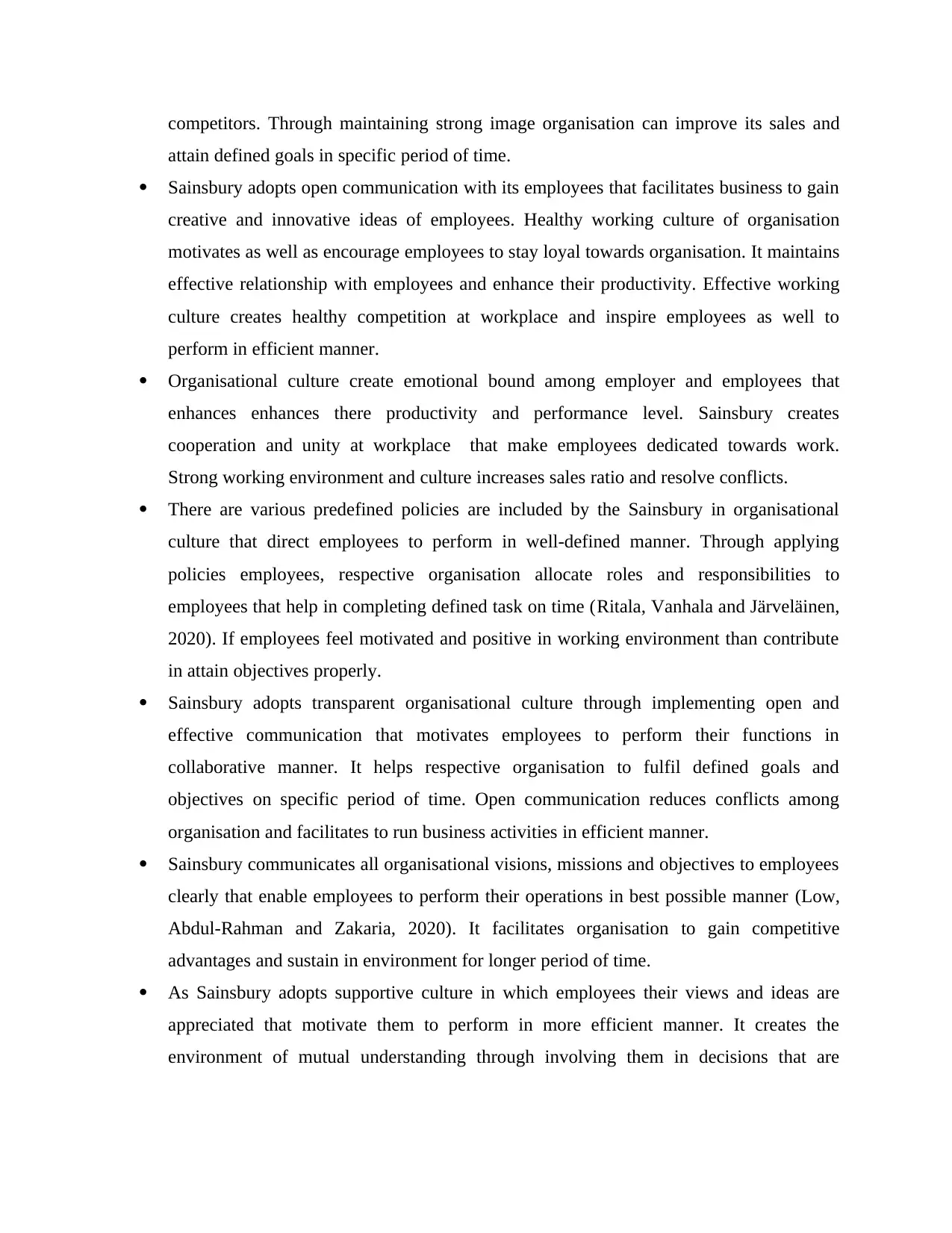
competitors. Through maintaining strong image organisation can improve its sales and
attain defined goals in specific period of time.
Sainsbury adopts open communication with its employees that facilitates business to gain
creative and innovative ideas of employees. Healthy working culture of organisation
motivates as well as encourage employees to stay loyal towards organisation. It maintains
effective relationship with employees and enhance their productivity. Effective working
culture creates healthy competition at workplace and inspire employees as well to
perform in efficient manner.
Organisational culture create emotional bound among employer and employees that
enhances enhances there productivity and performance level. Sainsbury creates
cooperation and unity at workplace that make employees dedicated towards work.
Strong working environment and culture increases sales ratio and resolve conflicts.
There are various predefined policies are included by the Sainsbury in organisational
culture that direct employees to perform in well-defined manner. Through applying
policies employees, respective organisation allocate roles and responsibilities to
employees that help in completing defined task on time (Ritala, Vanhala and Järveläinen,
2020). If employees feel motivated and positive in working environment than contribute
in attain objectives properly.
Sainsbury adopts transparent organisational culture through implementing open and
effective communication that motivates employees to perform their functions in
collaborative manner. It helps respective organisation to fulfil defined goals and
objectives on specific period of time. Open communication reduces conflicts among
organisation and facilitates to run business activities in efficient manner.
Sainsbury communicates all organisational visions, missions and objectives to employees
clearly that enable employees to perform their operations in best possible manner (Low,
Abdul-Rahman and Zakaria, 2020). It facilitates organisation to gain competitive
advantages and sustain in environment for longer period of time.
As Sainsbury adopts supportive culture in which employees their views and ideas are
appreciated that motivate them to perform in more efficient manner. It creates the
environment of mutual understanding through involving them in decisions that are
attain defined goals in specific period of time.
Sainsbury adopts open communication with its employees that facilitates business to gain
creative and innovative ideas of employees. Healthy working culture of organisation
motivates as well as encourage employees to stay loyal towards organisation. It maintains
effective relationship with employees and enhance their productivity. Effective working
culture creates healthy competition at workplace and inspire employees as well to
perform in efficient manner.
Organisational culture create emotional bound among employer and employees that
enhances enhances there productivity and performance level. Sainsbury creates
cooperation and unity at workplace that make employees dedicated towards work.
Strong working environment and culture increases sales ratio and resolve conflicts.
There are various predefined policies are included by the Sainsbury in organisational
culture that direct employees to perform in well-defined manner. Through applying
policies employees, respective organisation allocate roles and responsibilities to
employees that help in completing defined task on time (Ritala, Vanhala and Järveläinen,
2020). If employees feel motivated and positive in working environment than contribute
in attain objectives properly.
Sainsbury adopts transparent organisational culture through implementing open and
effective communication that motivates employees to perform their functions in
collaborative manner. It helps respective organisation to fulfil defined goals and
objectives on specific period of time. Open communication reduces conflicts among
organisation and facilitates to run business activities in efficient manner.
Sainsbury communicates all organisational visions, missions and objectives to employees
clearly that enable employees to perform their operations in best possible manner (Low,
Abdul-Rahman and Zakaria, 2020). It facilitates organisation to gain competitive
advantages and sustain in environment for longer period of time.
As Sainsbury adopts supportive culture in which employees their views and ideas are
appreciated that motivate them to perform in more efficient manner. It creates the
environment of mutual understanding through involving them in decisions that are
Secure Best Marks with AI Grader
Need help grading? Try our AI Grader for instant feedback on your assignments.
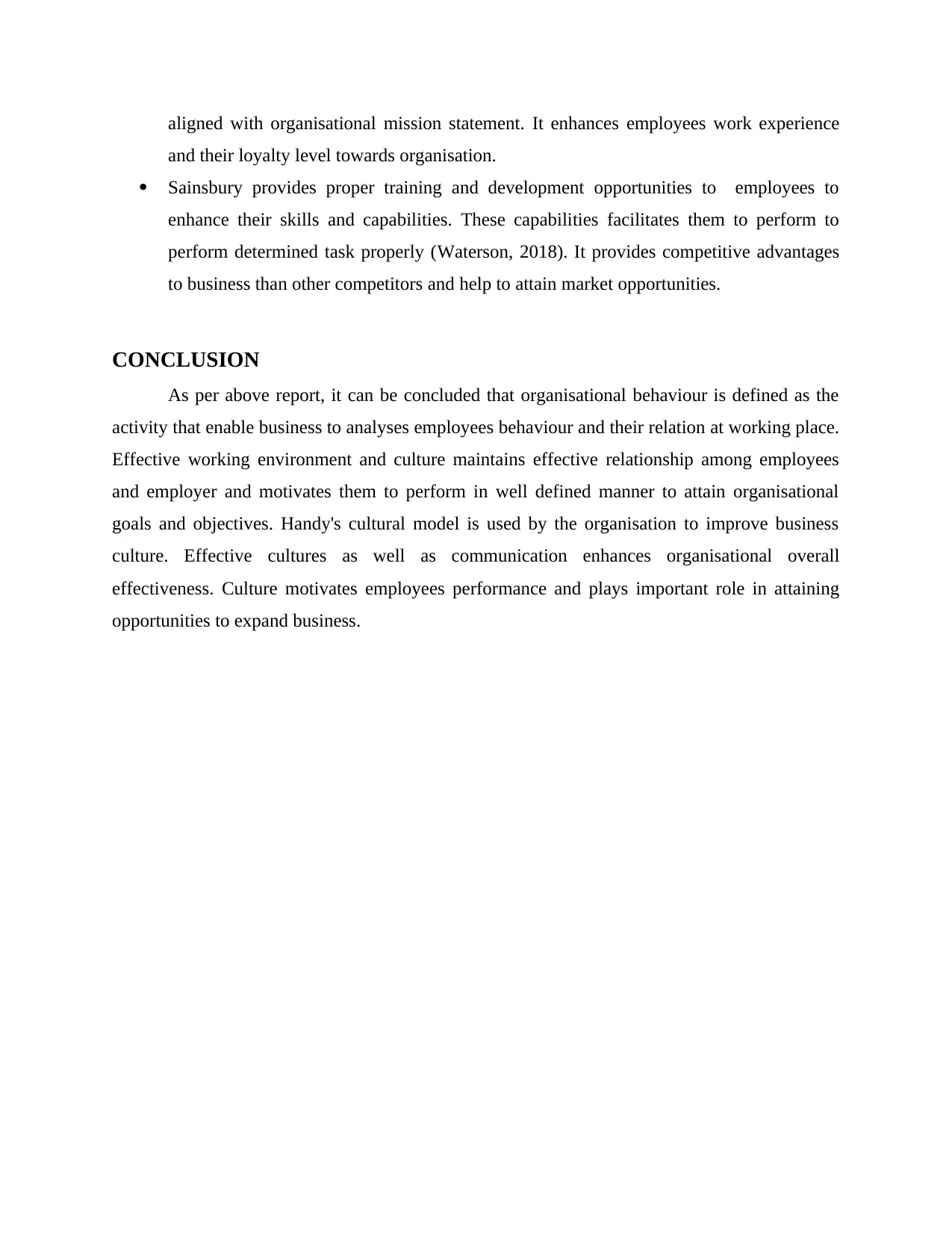
aligned with organisational mission statement. It enhances employees work experience
and their loyalty level towards organisation.
Sainsbury provides proper training and development opportunities to employees to
enhance their skills and capabilities. These capabilities facilitates them to perform to
perform determined task properly (Waterson, 2018). It provides competitive advantages
to business than other competitors and help to attain market opportunities.
CONCLUSION
As per above report, it can be concluded that organisational behaviour is defined as the
activity that enable business to analyses employees behaviour and their relation at working place.
Effective working environment and culture maintains effective relationship among employees
and employer and motivates them to perform in well defined manner to attain organisational
goals and objectives. Handy's cultural model is used by the organisation to improve business
culture. Effective cultures as well as communication enhances organisational overall
effectiveness. Culture motivates employees performance and plays important role in attaining
opportunities to expand business.
and their loyalty level towards organisation.
Sainsbury provides proper training and development opportunities to employees to
enhance their skills and capabilities. These capabilities facilitates them to perform to
perform determined task properly (Waterson, 2018). It provides competitive advantages
to business than other competitors and help to attain market opportunities.
CONCLUSION
As per above report, it can be concluded that organisational behaviour is defined as the
activity that enable business to analyses employees behaviour and their relation at working place.
Effective working environment and culture maintains effective relationship among employees
and employer and motivates them to perform in well defined manner to attain organisational
goals and objectives. Handy's cultural model is used by the organisation to improve business
culture. Effective cultures as well as communication enhances organisational overall
effectiveness. Culture motivates employees performance and plays important role in attaining
opportunities to expand business.
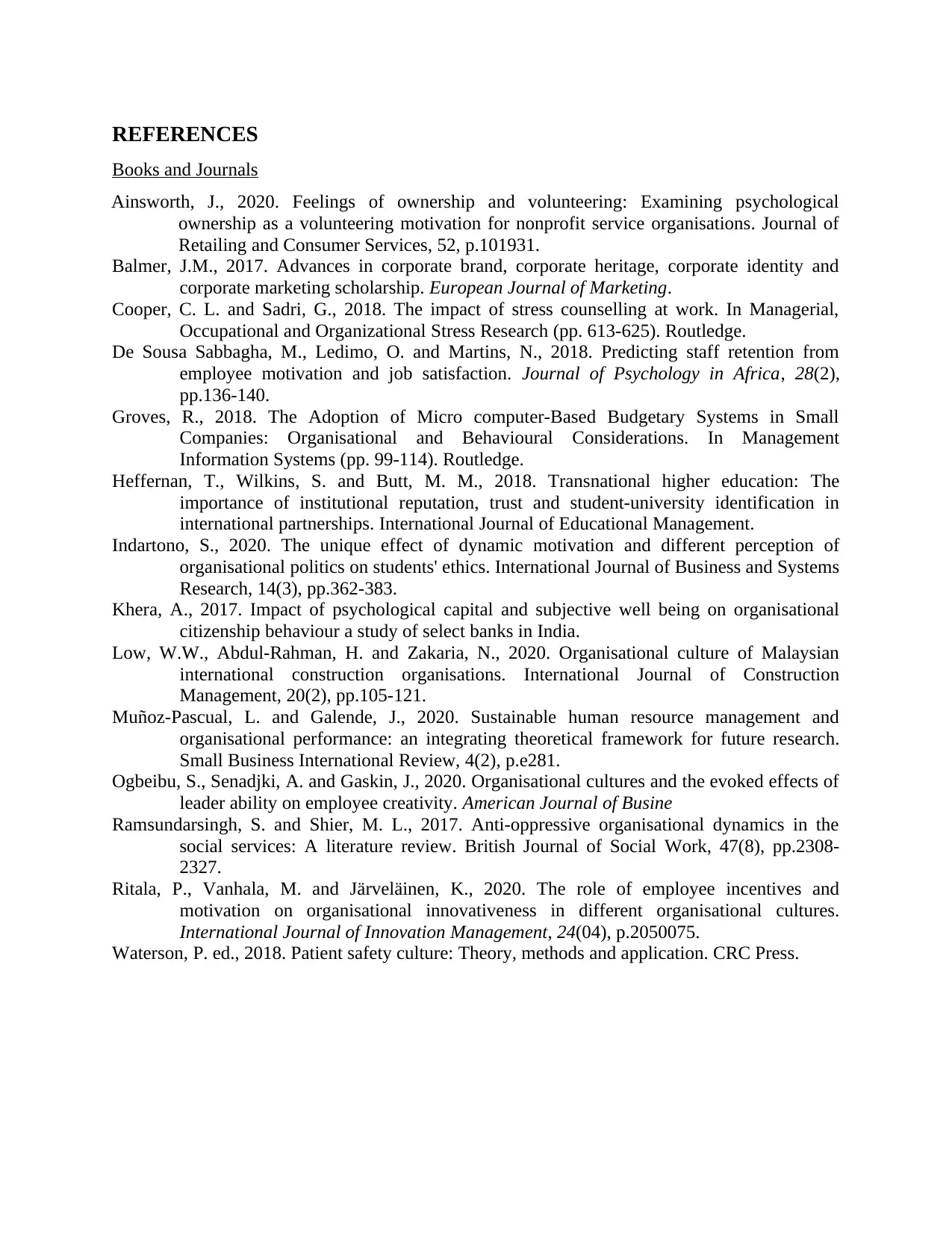
REFERENCES
Books and Journals
Ainsworth, J., 2020. Feelings of ownership and volunteering: Examining psychological
ownership as a volunteering motivation for nonprofit service organisations. Journal of
Retailing and Consumer Services, 52, p.101931.
Balmer, J.M., 2017. Advances in corporate brand, corporate heritage, corporate identity and
corporate marketing scholarship. European Journal of Marketing.
Cooper, C. L. and Sadri, G., 2018. The impact of stress counselling at work. In Managerial,
Occupational and Organizational Stress Research (pp. 613-625). Routledge.
De Sousa Sabbagha, M., Ledimo, O. and Martins, N., 2018. Predicting staff retention from
employee motivation and job satisfaction. Journal of Psychology in Africa, 28(2),
pp.136-140.
Groves, R., 2018. The Adoption of Micro computer-Based Budgetary Systems in Small
Companies: Organisational and Behavioural Considerations. In Management
Information Systems (pp. 99-114). Routledge.
Heffernan, T., Wilkins, S. and Butt, M. M., 2018. Transnational higher education: The
importance of institutional reputation, trust and student-university identification in
international partnerships. International Journal of Educational Management.
Indartono, S., 2020. The unique effect of dynamic motivation and different perception of
organisational politics on students' ethics. International Journal of Business and Systems
Research, 14(3), pp.362-383.
Khera, A., 2017. Impact of psychological capital and subjective well being on organisational
citizenship behaviour a study of select banks in India.
Low, W.W., Abdul-Rahman, H. and Zakaria, N., 2020. Organisational culture of Malaysian
international construction organisations. International Journal of Construction
Management, 20(2), pp.105-121.
Muñoz-Pascual, L. and Galende, J., 2020. Sustainable human resource management and
organisational performance: an integrating theoretical framework for future research.
Small Business International Review, 4(2), p.e281.
Ogbeibu, S., Senadjki, A. and Gaskin, J., 2020. Organisational cultures and the evoked effects of
leader ability on employee creativity. American Journal of Busine
Ramsundarsingh, S. and Shier, M. L., 2017. Anti-oppressive organisational dynamics in the
social services: A literature review. British Journal of Social Work, 47(8), pp.2308-
2327.
Ritala, P., Vanhala, M. and Järveläinen, K., 2020. The role of employee incentives and
motivation on organisational innovativeness in different organisational cultures.
International Journal of Innovation Management, 24(04), p.2050075.
Waterson, P. ed., 2018. Patient safety culture: Theory, methods and application. CRC Press.
Books and Journals
Ainsworth, J., 2020. Feelings of ownership and volunteering: Examining psychological
ownership as a volunteering motivation for nonprofit service organisations. Journal of
Retailing and Consumer Services, 52, p.101931.
Balmer, J.M., 2017. Advances in corporate brand, corporate heritage, corporate identity and
corporate marketing scholarship. European Journal of Marketing.
Cooper, C. L. and Sadri, G., 2018. The impact of stress counselling at work. In Managerial,
Occupational and Organizational Stress Research (pp. 613-625). Routledge.
De Sousa Sabbagha, M., Ledimo, O. and Martins, N., 2018. Predicting staff retention from
employee motivation and job satisfaction. Journal of Psychology in Africa, 28(2),
pp.136-140.
Groves, R., 2018. The Adoption of Micro computer-Based Budgetary Systems in Small
Companies: Organisational and Behavioural Considerations. In Management
Information Systems (pp. 99-114). Routledge.
Heffernan, T., Wilkins, S. and Butt, M. M., 2018. Transnational higher education: The
importance of institutional reputation, trust and student-university identification in
international partnerships. International Journal of Educational Management.
Indartono, S., 2020. The unique effect of dynamic motivation and different perception of
organisational politics on students' ethics. International Journal of Business and Systems
Research, 14(3), pp.362-383.
Khera, A., 2017. Impact of psychological capital and subjective well being on organisational
citizenship behaviour a study of select banks in India.
Low, W.W., Abdul-Rahman, H. and Zakaria, N., 2020. Organisational culture of Malaysian
international construction organisations. International Journal of Construction
Management, 20(2), pp.105-121.
Muñoz-Pascual, L. and Galende, J., 2020. Sustainable human resource management and
organisational performance: an integrating theoretical framework for future research.
Small Business International Review, 4(2), p.e281.
Ogbeibu, S., Senadjki, A. and Gaskin, J., 2020. Organisational cultures and the evoked effects of
leader ability on employee creativity. American Journal of Busine
Ramsundarsingh, S. and Shier, M. L., 2017. Anti-oppressive organisational dynamics in the
social services: A literature review. British Journal of Social Work, 47(8), pp.2308-
2327.
Ritala, P., Vanhala, M. and Järveläinen, K., 2020. The role of employee incentives and
motivation on organisational innovativeness in different organisational cultures.
International Journal of Innovation Management, 24(04), p.2050075.
Waterson, P. ed., 2018. Patient safety culture: Theory, methods and application. CRC Press.

Paraphrase This Document
Need a fresh take? Get an instant paraphrase of this document with our AI Paraphraser

1 out of 14
Your All-in-One AI-Powered Toolkit for Academic Success.
+13062052269
info@desklib.com
Available 24*7 on WhatsApp / Email
![[object Object]](/_next/static/media/star-bottom.7253800d.svg)
Unlock your academic potential
© 2024 | Zucol Services PVT LTD | All rights reserved.




